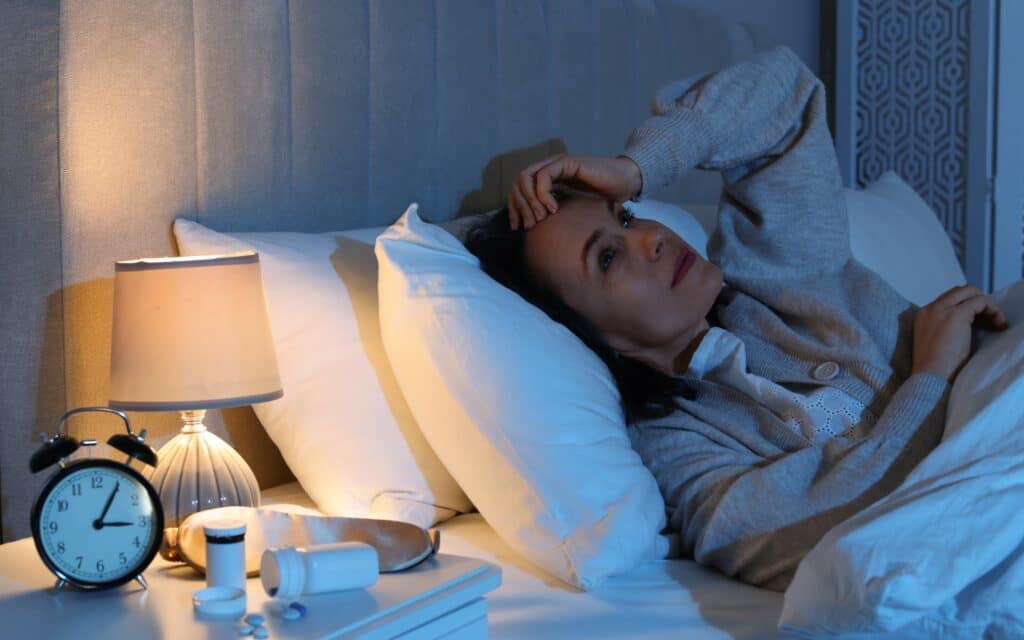Gabapentin for sleep is a treatment option rapidly gaining attention in a number of medical circles. Though technically, this medication is intended for the treatment of epilepsy and nerve pain, it has also begun to demonstrate some efficacy for the treatment of insomnia.
Insomnia and trouble sleeping can be an extremely complex challenge to overcome. Though changes to your sleep hygiene routine and other natural strategies are often the best option long-term, sometimes it helps to consider medication when your issues reach unmanageable levels.
Certain medications intended for other forms of treatment, like dealing with seizures or nerve pain, can sometimes help to counteract sleeping problems too.
Today, we’re going to explore the potential of gabapentin for insomnia.
What is gabapentin for insomnia?
Gabapentin, also known as “Neurontin”, for sleep, is a prescription anticonvulsant medication. This substance is meant for the treatment of nerve pain, and to help prevent seizures in epileptic patients. Studies have also shown gabapentin may be effective at treating various other conditions, including migraines, anxiety, and restless legs syndrome.
Experts believe gabapentin works by interacting with GABA receptors in the central nervous system. Gabapentin also increases calcium levels, which can help to balance brain chemistry.
When it comes to gabapentin for sleep, researchers suggest this substance may be effective at improving slow-wave sleep. This sleep stage is commonly associated with memory consolidation. It’s also shown to be effective at improving sleep efficiency, which means you get a better quality of sleep when you do go to bed.
Gabapentin is prescribed as an “off-label” treatment for insomnia. This means it’s not actually intended for the treatment of sleep disorders, but is considered a relatively safe way to treat sleep conditions. There are many other similar medications which can be prescribed “off-label” for the same purpose.

What is the right gabapentin dosage for sleep?
When determining your Neurontin dosage for sleep, your doctor will need to balance any risk for side effects, against the potential gabapentin has to improve your sleep disorder. In studies, the prescribed amount of this substance has varied. Most doctors recommend a treatment of anywhere between 100mg and 400mg per night.
As with any medication, it’s important to listen to your doctor’s instructions when taking gabapentin for insomnia. If you don’t feel sleepy after taking this medication, or you feel your current dosage isn’t helping with your insomnia, you can consider reaching out to your doctor and asking for an increased dose.
In most cases, your doctor will start you on a lower dose of gabapentin to see how your body responds to the medication. After you’ve ruled out the risk of any significant side effects, you can sometimes increase your dosage over time.
Often, your doctor will also recommend supplementary treatment strategies alongside your medication. For instance, you may be advised to look into things like CBT-I to help with any anxiety you have about sleeping, or relaxation methods.
Neurontin for sleep: Is gabapentin a good sleep aid?
Most doctors are reluctant to prescribe any medication for sleep on a long-term basis. This is because many medications which help with insomnia can also have a number of side effects. Many drugs have a high risk of dependency, and grogginess after use.
However, gabapentin is considered a relatively safe treatment for some sleep issues. It is often effective at encouraging sound sleep in many patients, according to studies. While this substance may not be considered suitable for all patients suffering from insomnia, it could have a positive impact on people with severe sleep disorders.
Research shows that gabapentin helps to put the mind into the right state for the deeper, slow-wave sleep. This increases your overall sleep time and improves sleep quality, producing a good night’s rest.
Because you’re in a deeper stage of sleep when taking this medication, you’re less likely to wake up through the night and suffer from tossing and turning.
As mentioned above, other studies have found gabapentin for sleep can significantly improve the quality of rest you get. It reduces common issues like falling asleep too late, or waking up too early. Researchers also believe the substance may be just as effective as clonazepam at treating sleepiness related to depression.
Another study from 2014 found indivduals who experience occasional bouts of sleep disruption experienced a significant improvement in their sleep quality after taking this medication.
Similar studies have also found the medication may be an effective way to treat certain kinds of sleep disorders, like bruxism in insomniacs (grinding your teeth).
If you suffer from other medical conditions which influence your sleep, like chronic pain, gabapentin could help with this too. The substance can reduce significant nerve pain and discomfort, minimizing issues, which could stop you from sleeping soundly.

How long does it take for gabapentin to make you sleepy?
Gabapentin, like most medications, can work differently for different people. Most of the time, when this medication is prescribed for its intended purpose, you’ll be asked to take it three times a day, to help spread the effects out over the day. However, if you’re taking gabapentin for sleep, you may be asked to take a single dose at night.
It can take a while for gabapentin, like many medications, to work its way into your system and start making a difference to your sleep pattern. Some people find they need to take the medication for a few days or weeks, before they see the full impact.
Most of the time, gabapentin can help to make you feel sleepier almost straight away. If you’re taking the immediate release tablets, which you often will be for insomnia purposes, it takes around 2 to 3 hours for the medication to reach its full effect.
You can usually take this substance around an hour before bed to get the best results. However, you may want to experiment with the guidance of your doctor depending on how you respond to gabapentin, once you begin taking it.
Are there any side effects of gabapentin for sleep?
All medications can have side effects beyond their intended results. With this in mind, it’s important to consider whether gabapentin for sleep is best for you, based on your unique circumstances. First, your doctor will need to ensure you’re not allergic to anything within the medication.
Allergic reactions can be extremely dangerous, though they’re not common for people taking gabapentin for insomnia. Make sure your doctor is aware of any allergies you might have before you begin discussing dosage options.
It’s also worth ensuring Neurontin for sleep won’t interact poorly with any medications you’re already taking. There can be interactions between this substance and other common treatments for a range of ailments.
Outside of potential allergic reactions and unwanted interactions, some of the most common side-effects you should be aware of include:
- Clumsiness or inability to coordinate
- Issues with falling sick more often (usually with viruses and infections)
- Drowsiness or significant sleepiness
- Gastrointestinal issues like nausea and vomiting
- Upset stomach, diarrhoea or abdominal pain
- Tremors or constant shaking
- Problems speaking clearly, or speech delays
- Swelling in the limbs, such as the legs and feet
- Tiredness or fatigue even after a good night’s sleep
- Mobility issues with stiff and jerky movements
- Shortness of breath
Some people may also experience vision problems, and general feelings of unwellness, accompanied by cold and flu like symptoms. If you have any negative reactions to gabapentin for sleep, it’s important to seek assistance from your doctor. Even if you believe this medication is helping with your sleep conditions, you may need to consider an alternative.
Some people also feel groggy long after taking their medication when using Neurontin for sleep. With this in mind, it’s important to avoid operating any machinery or doing any activities which may put you in danger.
Should you use gabapentin for insomnia?
Gabapentin for sleep can be a powerful and effective treatment option for some people suffering from sleep disorders. While this medication isn’t guaranteed to work for everyone, it can be a useful tool for improving short-wave (deep sleep) and sleep quality in those suffering from insomnia.
As with all medications offered for sleep, particularly those provided “off label” it’s important to consider all of your options carefully before you begin gabapentin. Speak to your doctor about the different kinds of medications you can use. This should help you to ensure you’re getting the right treatment for your condition.
Siestio. Sleep Matters.
Now read these:
—Quetiapine for insomnia
—Trimipramine for sleep
—Olanzapine for insomnia
Medical disclaimer
You must not rely on the information provided on our website as an alternative to medical advice from your doctor or other healthcare professionals. For more information read our full disclaimer here.







